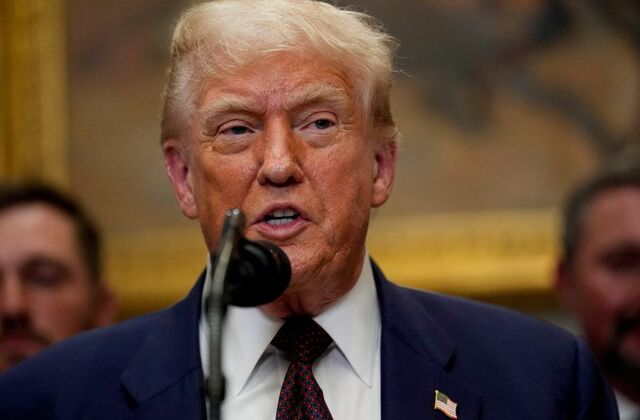
Former US President Donald Trump is facing growing criticism after comments made at a recent press conference revealed his apparent lack of awareness about ongoing US imports from Russia, even as he continues to attack India for its energy ties with Moscow.
Trump’s comments came in response to a reporter’s question highlighting India’s claim that the United States, despite its strong rhetoric against Russian energy trade, continues to import enriched uranium, fertilisers, and palladium from Russia.
“I don’t know anything about it. I have to check it out,” Trump said during the White House press briefing, which was originally called to discuss the 2028 Los Angeles Olympics.
However, trade data reveals a different story. Since January 2022, the US has imported over $24.5 billion worth of goods from Russia. In 2024 alone, America bought $1.27 billion worth of fertilisers, $624 million in uranium and plutonium, and around $878 million in palladium—a critical metal used in electric vehicle manufacturing.
India’s Response and the “Double Standards” Debate
India, which has seen its crude oil imports from Russia surge from less than 1% to over 35% in the wake of the Ukraine conflict, has been under pressure from Western powers to reduce its energy ties with Moscow.
In response to Trump’s threats to “very substantially” increase the 25% tariff on Indian imports, India issued a strong statement condemning what it called “unjustified and unreasonable” criticism.
The Ministry of External Affairs (MEA) defended India’s energy strategy, stating that its decision to buy oil from Russia was driven by market disruptions caused by the war and the redirection of Middle Eastern oil to Europe.
“India’s energy imports are a necessity, not a choice. Unlike the US, our trade with Russia is guided by affordability and predictability, not profit,” said an MEA spokesperson.
India also pointed out that several Western countries, including the US, continue to engage in trade with Russia—highlighting a clear case of “Western hypocrisy”.
Trump’s Tariff Threat and China’s Exemption
Trump’s stance appears even more controversial given that China, the largest buyer of Russian and Iranian oil, was recently granted a 90-day tariff pause. Indian-American politician Nikki Haley criticized this move, warning Trump against jeopardizing relations with India, a long-standing US ally.
“Don’t give China a pass and burn a relationship with a strong ally like India,” Haley posted on X (formerly Twitter).
Trump’s argument is centered on the claim that India is “fueling the Russian war machine” by buying discounted oil and reselling it for profit on global markets. “They’re making money off a war while people are dying in Ukraine,” he said in a recent interview with CNBC.
However, critics argue that these claims are inconsistent with US actions. The American government has not issued a directive to halt imports of Russian uranium, which is vital for its nuclear energy industry.
Economic and Strategic Realities
India’s growing imports from Russia have been a response to sanctions on Moscow that disrupted global oil supply chains. With traditional suppliers in the Middle East shifting focus to European buyers, India turned to Russia for more affordable energy.
“The global situation has compelled us to diversify our suppliers. National interest and energy security remain our top priorities,” said MEA spokesperson Randhir Jaiswal.
Experts believe that targeting India while continuing US-Russia trade could strain Washington’s relations with New Delhi and weaken its Indo-Pacific strategy.
“India is not violating any international law. The US needs to look inward before blaming others,” said political analyst Dr. A. Mehta.
The Road Ahead
While Trump has not specified the exact increase in tariffs, he has hinted at “major actions” against countries that continue to engage with Russia. His 25% tariff could rise substantially in the coming days, he warned.
India, however, remains firm. “Our decisions are based on national security and market realities,” the MEA stated, emphasizing that no external pressure will dictate India’s trade policies.
As tensions rise, the world watches closely. Whether Trump’s rhetoric will translate into action—or diplomatic backlash—remains to be seen.














